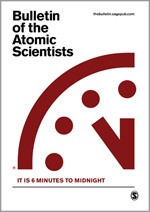
|
|
|
|
|
|
|
News & Views item - January 2012 |
![]() Bulletin of the Atomic Scientists Moves the Hands of the Doomsday Clock 1-Minute
Closer to Midnight. (January 11, 2012)
Bulletin of the Atomic Scientists Moves the Hands of the Doomsday Clock 1-Minute
Closer to Midnight. (January 11, 2012)
The Bulletin of the Atomic Scientists (BAS) announced today that it was advancing the hands of its doomsday clock to 5 Minutes to Midnight.
Its formal statement reads: "It is five minutes to midnight. Two years ago, it appeared that world leaders might address the truly global threats that we face. In many cases, that trend has not continued or been reversed. For that reason, the Bulletin of the Atomic Scientists is moving the clock hand one minute closer to midnight, back to its time in 2007."
Theoretical physicist Lawrence Krauss, co-chair of the BAS Board of Sponsors, amplified: "Unfortunately, Einstein's statement in 1946 that 'everything has changed, save the way we think,' remains true. The provisional developments of 2 years ago have not been sustained, and it makes sense to move the clock closer to midnight, back to the value it had in 2007. Faced with clear and present dangers of nuclear proliferation and climate change, and the need to find sustainable and safe sources of energy, world leaders are failing to change business as usual. Inaction on key issues including climate change, and rising international tensions motivate the movement of the clock. As we see it, the major challenge at the heart of humanity's survival in the 21st century is how to meet energy needs for economic growth in developing and industrial countries without further damaging the climate, exposing people to loss of health and community, and without risking further spread of nuclear weapons, and in fact setting the stage for global reductions."
Kennette Benedict, executive director of BAS made a plea for "scientists and experts to join us in engaging ordinary citizens. Together, we can present the most significant questions to policymakers and industry leaders. Most importantly, we can demand answers and action."
And BAS noted that a series of key recommendations for a safer world have not been taken up, yet require urgent attention, including:
_________________________
And to demonstrate the importance of science to policy making by the Australian Government led by Prime Minister Julia Gillard, the most recent meeting by the Prime Minister's Science, Engineering and Innovation Council (PMSEIC) was held on February 4, 2011-- well over 11-months ago.
US President Barack Obama's Council of Advisors on Science and Technology (PCAST) meets six times a year and has direct access through its chairman, John Holdren, to the US President.